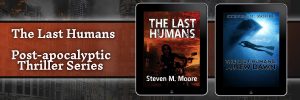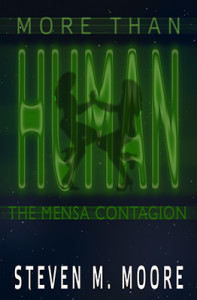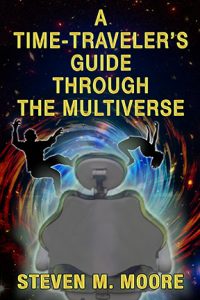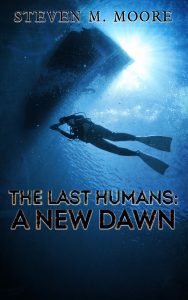[Note from Steve: Because this is yet another British-style mystery story, the metaphor of the title here refers to London’s Underground aka the Tube. Trains there, unlike NYC’s, actually have four rails with two live ones. The positive third rail is still outside the rails the car wheels ride on and has the higher voltage, which is twice the fourth with negative voltage, nestled between the two regular train ones. Now there’s a factoid that might stump any Jeopardy contestant!]
Living on the Third Rail
Copyright 2021, Steven M. Moore
Chapter Six
Before Bobby left with Wolfgang for the castle the next morning, he had another quick breakfast with Elaine.
“You look knackered, Inspector.”
“I guess I wasn’t quite ready to have an important case right at the start of my DI work. Got to get into it some time, I suppose, but it’s been exhausting, and we’re just in early days. How’s it going with you?”
Bobby didn’t want to give her any of the gory details. He eyed her and managed a smile, feeding off her concern. It was nice to have someone worried about him. This woman is special, but is she nursing me or interested in something more?
He knew veterans often had relationship issues. Especially in his current line of work, he had to fight depression. A plod often sees the worst of humanity. And seeing Maria’s body on that exam table was more than depressing. Wolfgang was right. No one deserved to have their life ended that way, especially a vibrant, young woman. And I was just at the prelim! He thought about sending someone else for the full autopsy.
“You look fresh, not knackered. In fact, you look good, Elaine.” Should I say that to a woman I hardly know? Due to Elaine’s ER schedule, there was no way to call the previous dinner a serious date. “But I bet the ER is stressful.”
“Sometimes it’s just routine, which I’m used to handling. It’s when we receive cases all at once time that it becomes hectic. That usually involves motorway accidents with multiple collisions, but we had a mass shooting once. And then there was Covid, of course.”
They talked about the pandemic a bit, and then he told her about their upcoming trip to a castle. He couldn’t give her many details, and he was surprised by her comments.
“I always wanted to live in a castle when I was a little girl. To be married to a prince like Diana was.”
“That didn’t turn out so well for her, although he still got to be king.”
“Oh, don’t get me wrong. I have no use for the whole lot. They’re leeches who cut ribbons and such to give people their fixes for their addictions to pomp and circumstance, and they call that work.”
Those are strong words, Bobby thought, but she had said them with a smile. Of course, they echoed his sentiments.
“I never think about royalty much,” he said to continue with a more neutral and less personal discussion. “They’re like Big Ben or Trafalgar Square, you know: Just sad monuments to the golden age of the once mighty British Empire. I think most people just take them for granted like London’s air pollution. I certainly do.”
“In a sense, we both work for them.”
He laughed. “I doubt our yearly salaries even come close to what they spend in a month. And I’d wager the government spent more keeping our troops in Afghanistan than what all the royals combined spend.”
“Doesn’t mean I wouldn’t like a wee raise now and then,” she said with a laugh.
“No I suspect we’re like civil servants most everywhere, lost in the lower middle class. I’m just happy to have a job right now, along with that bit of promotion that came with it.”
“So tell me about the German bloke.”
“He’s from Interpol and will be a consultant for the case for reasons I don’t want to get into. He’s headquartered in Lyon, though, so I suspect he speaks French as well as German and English.”
“Ooh-la-la,” she said. “Prussian or Bavarian?”
Bobby shrugged. How do you tell? “He’s from Munich.”
“Most likely Bavarian then. That would make him more interesting. I’ve been looking for someone to teach me the polka.”
He raised an eyebrow. “I went out and celebrated my last night at Ramstein airbase trying to dance polkas and Viennese waltzes while drunk. I gave it my all, but I think I need many more lessons. A rather heavyset fraulein flung me around the dance floor. Hardly dancing, I dare say.”
She thought a moment. “Maybe we can take lessons together.”
“I’d like that, but fair warning to your toes if I step on them.”
“I want to learn some Latin dances too.”
“Are you planning a new career?”
“Heavens no! There’s just a certain Met inspector I’d like to dance with.”
He smiled. “Now I’m jealous. Who is he?”
“You, idiot! Who knows? You might also be my Prince Charming. Just call me Cinders.”
He thought she might be mixing up her fairy tales, but he liked her comments.
***
“I heard you were at Ramstein,” Wolfgang said as they walked towards the castle’s entrance.
“I didn’t get to see much of the local color,” Bobby said, showing his prosthetic.
“I noticed that. Oh well, you can always take a holiday in Germany. Munich’s the best place to go, unless you want to float down the Danube and visit Austria as well.”
“And I heard you’re from there.” Bobby smiled at Wolfgang. “Bundespolizei.”
“Guilty as charged. And I like to promote my home town.”
“To the chore at hand. How did these people get this castle again? They’re not British toffs.”
“They bought it, I suppose. We don’t have that information. Aren’t your aristocrats getting so poor with the tax hikes that they’re selling off everything?”
“Some have been doing that all along, long before Brexit and Covid. It takes quite a dosh to maintain a place like this.” Bobby studied the front door. “I think we have to pull this ring. Careful. Big Ben-like chimes might sound.”
Bobby was right. The door chimes sounded from deep within the castle; for the sound to reach them through the solid wooden door, they had to be loud. He waited a bit and then pulled the chain again. He was about to pull it a third time when a tall old man in a butler uniform appeared.
“DI Robert Sherman of Scotland Yard and Interpol agent Wolfgang Lange.” They showed him their credentials. “We have an appointment with Mr. and Mrs. Girardi.”
“Of course. Follow me, gentlemen.”
They were led down a long hall and then into a sitting room that looked like something from Buckingham Palace.
“You may take seats over by the fireplace. Shall I bring you tea service?”
“That would be splendid,” Wolfgang said with a smile.
The tea service arrived before Mr. and Mrs. Girardi: Four delicate China cups; a large matching teapot, with its sugar bowl and milk pitcher; and a plate of cakes.
“Don’t get used to it,” Bobby told Wolfgang in a whisper.
“They’re not English toffs, but they live like ones,” Wolfgang said.
Bobby thought it was prudent to wait for their hosts, who soon appeared. After introductions and taking seats, the aunt became mother. She seemed to glide upon a magic cloud of perfume as she performed the ritual, giving everyone tea and then offering the cakes. With the tea, she pointed to the sugar cubes and milk; when it was his turn, Bobby declined the milk and signaled for one cube. She winked at him and smiled.
Is she flirting, implying the one cube was perfect because I’m already so sweet? Or is it all just my imagination? Maybe the years spent in Afghanistan with mostly sweaty, unwashed men had affected how he related to women and didn’t permit a close but socially acceptable connection. He thought of Elaine.
But Bobby connected with the pair of Swiss ex-pats. They seemed like nice people, but a police detective had to be more objective. Niceness could always just be a charade. Let’s see if it is.
Mr. Girardi, who looked like one of the gnome-bankers from the Harry Potter movies, albeit more pleasant, spoke in his soft, gravelly voice.
“And what brings you to Pembroke Castle, gentlemen? Our humble abode isn’t the most famous one, of course, but we welcome you all the same.”
Mrs. Girardi winked at them and smiled again. She was much younger than her husband but deferred to him. She knows her place, Bobby thought.
“An urgent family matter, perhaps. Have you spoken to your niece Maria recently?”
“Is she the missing person your sergeant mentioned when she rang?” Bobby nodded. “She’s hardly missing then. She’s still living in Italy, I presume. Milan, to be precise.”
Bobby decided to shake up the bloke a bit. Sometimes shock value was warranted. “I regret that I must correct that presumption. We found Maria Girardi’s body in a London alleyway.”
“Oh my Lord!” Mrs. Girardi covered her mouth after uttering her first words.
“That is terrible news,” said Mr. Girardi. He looked genuinely sad. “Have you informed her parents?”
“No. We understand Maria and they were estranged.” Wolfgang was studying the pair’s reactions as much as Bobby. Did he too doubt their concern was authentic?
Mr. Girardi’s answer neither confirmed nor denied that. Instead he said, “Maria was always a bit headstrong. She is—was an independent young lady, to say the least.”
“Did you know Interpol has been looking for her as one of five suspects who stole jewels in Italy?” Bobby said. “Milan, to be precise.”
The husband looked at his wife and then back at Wolfgang. “Lord no! When she was here, she mentioned nothing about that.”
“So…” Bobby said, “she was here.”
The old Swiss-Italian realized his mistake. “We only try to protect her, Inspector. She wouldn’t give us any details, but she was frightened and wanted to hide here for a while. I thought it had something to do with my brother.”
Read the rest of this entry »
 Comments are always welcome. (Please follow the rules on the “Join the Conversation” web page.)
Comments are always welcome. (Please follow the rules on the “Join the Conversation” web page.)





